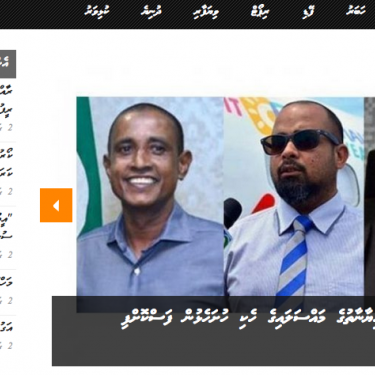RSF calls on Maldives to stop dismantling critical media

Reporters Without Borders (RSF) is alarmed by mounting government hostility towards critical and independent news media in Maldives, where the editor of a news website has just revealed that it was forced to close by government pressure, and calls on the Commonwealth to react without delay.
Ismail Rasheed, the editor of a popular website called Channel News Maldives (CNM), issued a statement on 25 June denying claims by the businessman who owns the majority share in the website that it had to close for economic reasons.
“At first, attempts were made to take over the company and transfer it into a pro-government new website,” said Rasheed, who was the website’s minority shareholder as well as its editor when it was finally shut down on the night of 24 June.
“When this did not become successful, pressure was mounted to completely close down the company,” Rasheed said. Insisting he resisted as long as possible, Rasheed added that he finally accepted the closure so that “the businessman behind the financing of CNM does not face further challenges” and to ensure that CNM’s five-year-old archive of articles and photos was not destroyed.
“The close of Channel News Maldives is very bad news for pluralism and democracy in Maldives,” said Benjamin Ismaïl, the head of RSF’s Asia-Pacific desk.
“The disappearance of one of the last media outlets still daring to criticize the government will inevitably be accompanied by an increase in self-censorship by the few remaining independent media still operating. The pressure from the government must stop, and the Commonwealth must react urgently so that Maldives does not end up with a political system that only has room for pro-government views.”
Pressure on the media has been mounting for months. On 12 April, the supreme court upheld an August 2015 high court decision splitting the ownership of Haveeru, the country’s oldest independent daily – a decision that forced the newspaper to stop producing a print issue and finally to close its website.
Just days later, the government-controlled Communications Authority of the Maldives ordered the country’s three Internet service providers to block access to Addu Live, an independent news website. The site’s representatives attributed the blocking to its coverage of government corruption.
In a parallel development, 16 journalists were arrested on 3 April while staging a demonstration in Malé in protest against the decline in government respect for media freedom.
An Indian Ocean archipelago, Maldives is ranked 112th out of 180 countries in RSF’s 2015 World Press Freedom Index, after falling 60 places since 2010.



